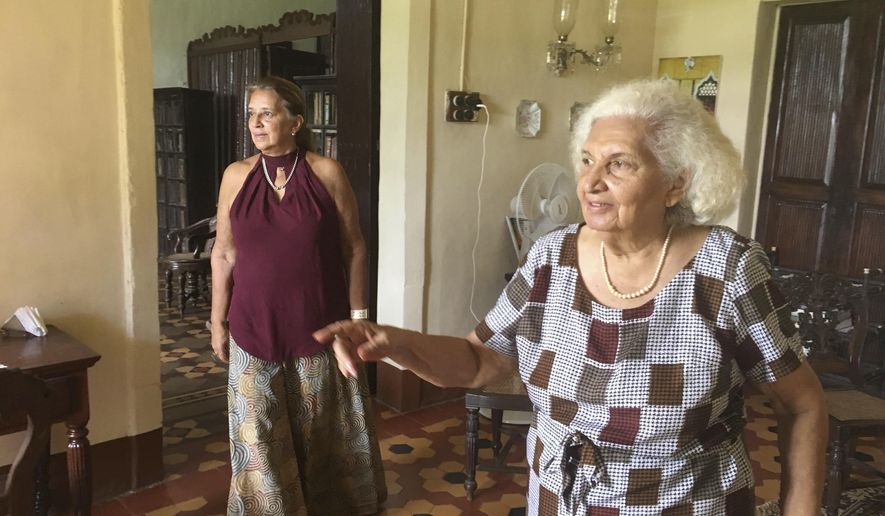LOUTOLIM, India (AP) - Age sits lightly on the sprawling, 4-centuries-old Figueiredo Mansion.
The home is a lived-in repository of memories tracing to the days when the west-coast Indian state of Goa was a Portuguese colony.
The Figueiredo family of Portuguese diplomats, lawyers and parliamentarians began building the mansion in 1590 as they made their home in quaint Loutolim, surrounded by paddy fields and a few neighbors. The family added a second section with similar design to the home 200 years later.
Today, about an hour’s drive from Goa’s airport, a rundown, roadside sign reads “Casa Museu V.J. De Figueiredo Loutolim” to let visitors know they’ve reached their destination.
Far from the party beaches and liquor shacks for which Goa is now known, the mansion operates as a homestay and a museum, filled with antique furniture and artifacts from the 17th century. The musty smell of aged wood fills arcaded corridors, with rooms to both sides.
“It’s really like Portugal in India,” said Portuguese student Pureza Lino, 19. “Sometimes I look at the walls and I see something that reminds me of my Mum. Or the smell, only the smell reminds me of my grandmother.”
Three generations of the Figueiredo family live in the house, a personal, living link to history.
___
At 87, Maria de Lourdes Figueiredo de Albuquerque is frail and speaks slowly, admitting her memory is fading. But her eyes light as she recalls the “many, many parties” hosted in the grand ballroom, with its wall-length mirrors, teak wood floors and Belgian crystal chandeliers.
Now the owner of the mansion, Maria de Lourdes grew up in the mansion along with her sister when the family was based in the west Indian state. She moved to Portugal as a young woman, where she witnessed the political turmoil that led to the end of the European country’s 451-year colonial rule in Goa in 1961.
A few years later, she became the first female member of Portugal’s parliament in 1965-69. Then, two decades ago she returned to Goa to help her sister take care of the home.
“We have to watch these things with some respect,” she said, her watchful eyes taking stock of the paintings and embroideries adorning the walls. “Because these things are not made every few years. It’s once made for ages.”
When her sister died with no children, Maria de Lourdes inherited. She rules out ever selling the property, saying her daughter and grandson would succeed her.
___
Maria de Fatima Figueiredo de Albuquerque, now in her 50s, was born in the house before the end of colonial rule but grew up in Portugal. Two years ago, she left her job as an executive with an international cosmetics company and returned to Goa to help her mother take care of the house.
“I knew I would come back to my roots someday,” she said, while giving visitors a tour of the museum.
Every artifact in the mansion has its own story, and Fatima’s narrative helps in bringing some of that composite culture alive for the guests. “This is the ballroom and all the furniture is made in Goa by Goans, and by Hindus, Muslims and Catholics,” Fatima said, pointing to a wooden chair with the figures of three Hindu gods carved into the back.
Nearby, an antique chest of drawers made of ivory, metal, rosewood and teak with images of lions carved into the base is similar to a piece in the Victoria & Albert Museum in London.
But that is “smaller than this one,” Fatima said. “This is the only one that exists with four lions and also in this size.”
Moving next through the dining room, Fatima points to another family treasure - a 60-piece crockery set made for the family by the East India Company some 200 years ago. Guests also delight in seeing the family’s 350-year old cradle, which Fatima herself was the last to use. Her own children were born in Portugal.
Other treasures included an 18th-century German piano, porcelain vases from China and Japan, mirrors and boxes with intricate gold filigree work and ceiling murals depicting Portuguese explorer Vasco De Gama’s journey to India by sea.
Taking care of so many treasures was daunting, Fatima said. “I hope that nothing can be broken during my existence in this house.”
Tourists said the walk through history was fascinating. Many said the mansion felt like a home, with its library stocked with old books in English, French and Spanish.
“You don’t have this opportunity every day,” said Liliana Sanchez, from Colombia.
___
Pedro Figueiredo de Albuquerque de Oliveira Novais, as Fatima’s only son, is already thinking about how to expand the mansion’s homestay business. He said taking over the family legacy would eventually be his duty, but that the property must sustain itself financially.
Born and raised in Lisbon, the 24-year-old trained as an industrial designer and has already begun overseeing renovations to create more rooms. The homestay currently offers five rooms, each fitted with air conditioners and modern bathrooms.
But maintaining the mansion to its original standards has become difficult, he said. Finding skilled and trustworthy craftsmen to restore antiques and repair the house is harder, with many of India’s artisanal crafts dying out.
Still, he plans to retain the hospitality and personal touch offered by his mother and grandmother.
“I never knew a lot of the family,” he said, but he wants to maintain the traditions. “I want to keep the experience of having dinner with guests.”
___
Follow Vineeta Deepak on Twitter at twitter.com/VineetaDeepak




Please read our comment policy before commenting.